Dumping the coffee grounds is the least pleasant part of brewing a good cup in the morning. Digging them out of your reusable filter or percolator is a hassle, so you just wash them down the sink.
But what’s this? Now your kitchen drain is clogged!
This is why you should never throw coffee grounds down the drain. But if you are staring at a stuffed-up sink, you probably wonder what dissolves coffee grounds.
Here are some tips on how to clear your clogged plumbing.
Why do coffee grounds clog drains?
If you’ve ever been washing used coffee grounds down the drain, you’ve probably had to clear a sink clogged with them. Coffee grounds are notorious for causing very difficult drain clogs.
But why is that?
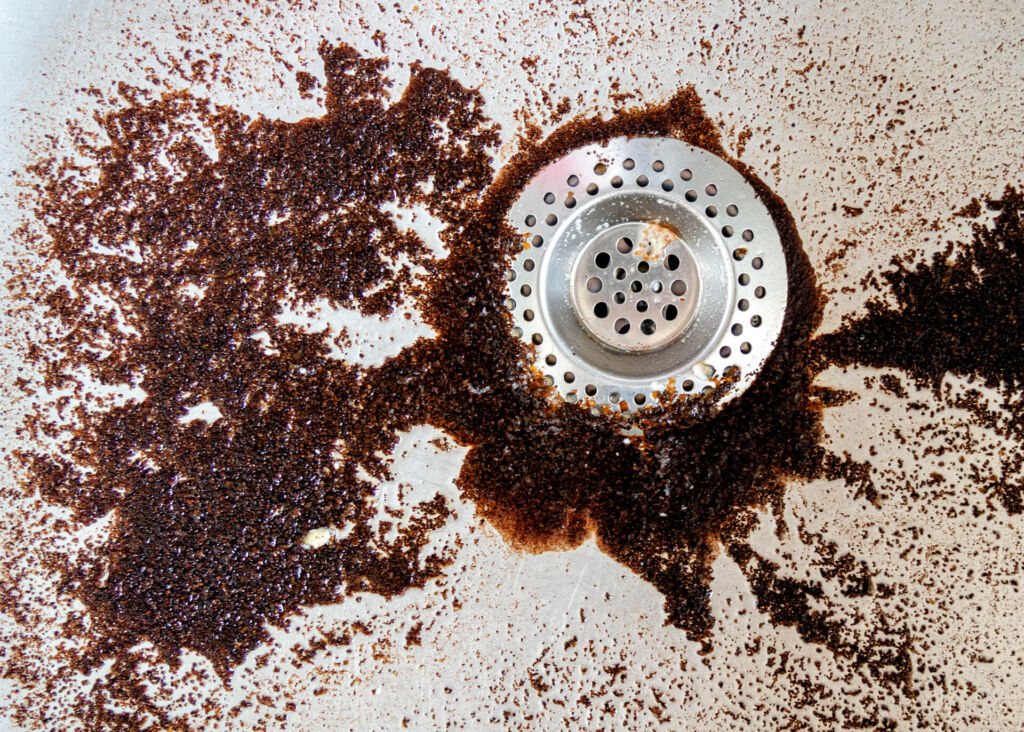
First, the ground coffee beans release natural oils as you brew coffee. When you pour the grounds into the drain, cold water can turn the coffee oils into solids. They form oily bonds with the coffee grounds and become a sticky mass.
Second, coffee grounds are the ideal size to clog a drain line. The coffee particles are large enough to form watertight seals. And because they are already chopped up, running them through garbage disposal won’t shred them any smaller.
Third, coffee beans are fibrous and difficult to break down. During roasting, some of their fibers and organic compounds become water-soluble — that’s why you can carry out the brewing process in the first place.
But once hot water has extracted the good stuff, what’s left in the coffee grounds is nothing but hard organic matter. Unlike instant coffee granules, leftovers from regular coffee are almost impossible to dissolve.
These three factors can cause wet, used coffee grounds to clump together in your plumbing. Once enough of them build up, they will completely clog the drain, and soon you have standing water in your sink.
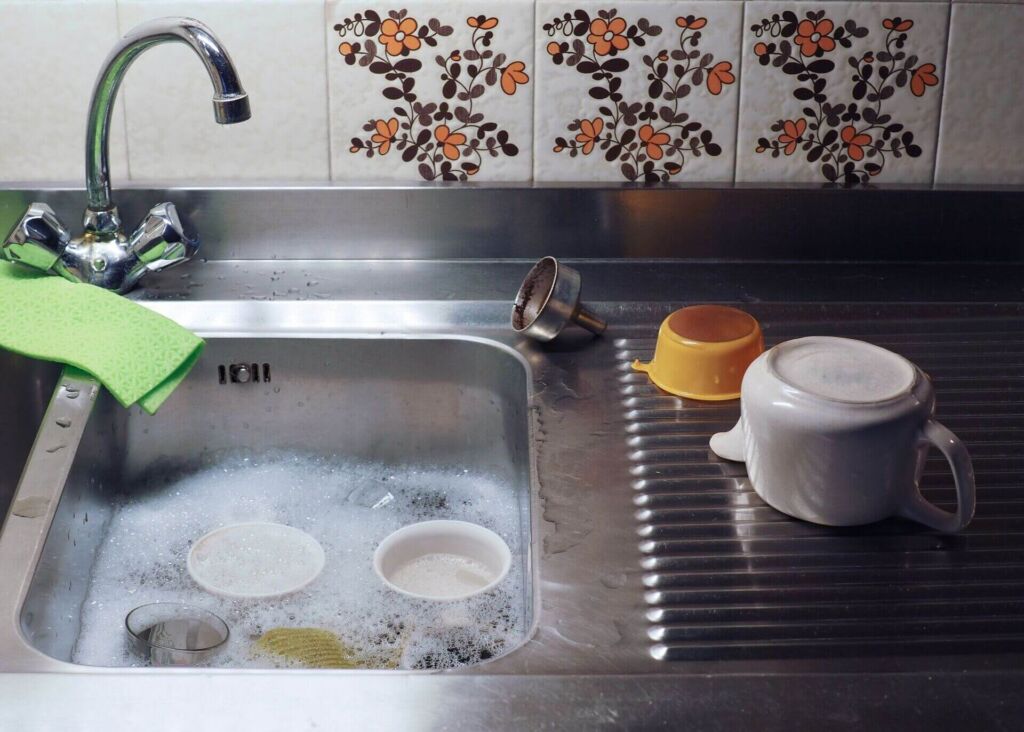
How to dissolve coffee grounds in a drain?
So, you dumped the coffee grounds from your Moka pot, French press coffee maker, or reusable metal filter into the sink. Staring at your now clogged drain, you wonder what dissolves coffee grounds.
Although coffee grounds are very difficult to dissolve completely, alkaline cleaners and chemicals can help clear a coffee ground clog. Coffee grounds are mildly acidic, so they don’t work well with acidic solutions. On the other hand, alkaline solutions can dissolve the oily bonds between the coffee particles and help wash the clog away.
Here are five methods to dissolve coffee grounds stuck in your plumbing pipes, ordered from the mildest to the harshest.
1. Baking soda
Here’s a surprise for you — baking soda can be the best method for dissolving coffee grounds. Since it’s alkaline, baking soda loosens and dissolves the oil that clumps coffee grounds.
Removing coffee grounds from the plumbing with baking soda is very simple. Pour a pot of hot water into the sink, followed by a cup of baking soda. Plug the sink with a drain cover, soak it for 10-15 minutes, and rinse with hot soapy water.
If you are lucky, the coffee grounds will dissolve with the baking soda treatment. But if the sink is still stuck, you can combine baking soda and vinegar into a more powerful homemade drain cleaner.
Follow the same process but add a cup of vinegar between the soda and the final dose of hot water. The acid-alkaline combination of vinegar and baking soda will likely break even the thickest coffee-based drain blockage.
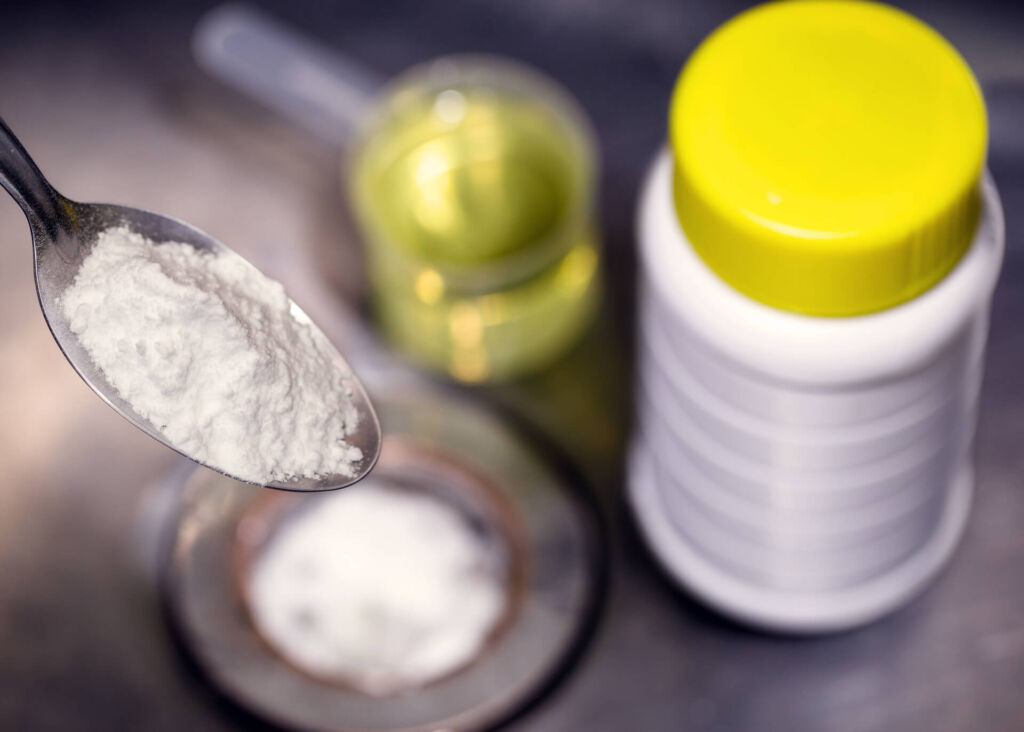
2. Vinegar
Is your kitchen sink draining slowly instead of completely clogged with coffee grounds? You may be able to use ordinary white vinegar to resolve the problem.
“Really? Can vinegar dissolve coffee grounds?” you ask. Well, no. Although vinegar is acidic, it’s not strong enough to dissolve coffee grounds.
Instead, it can eliminate the oil holding the grounds, food remnants, and other debris together. With their bonds weakened, running water through the drain line may be enough to dislodge the remaining coffee blockages.
Unlike highly corrosive strong acids, vinegar is safe to use as it won’t damage pipes, joints, or other plumbing components. As long as the clog isn’t too bad, vinegar can be a cheap and easy do-it-yourself method to remove coffee grounds safely.
3. Drain cleaner
Off-the-shelf drain cleaners, like Drano or Liquid Plumber, are a fine choice for clearing more difficult coffee ground clogs. Drain cleaners are extremely alkaline and can effectively dissolve coffee grounds and oils.
These strong chemicals can cause skin or eye irritation if used carelessly. Always pour them carefully down the sink and wear gloves when using them.
Another thing to note is that you should always pick alkaline cleaners over acidic ones. An acid-based substance can eat through your kitchen pipes and other plumbing, causing severe and expensive damage.
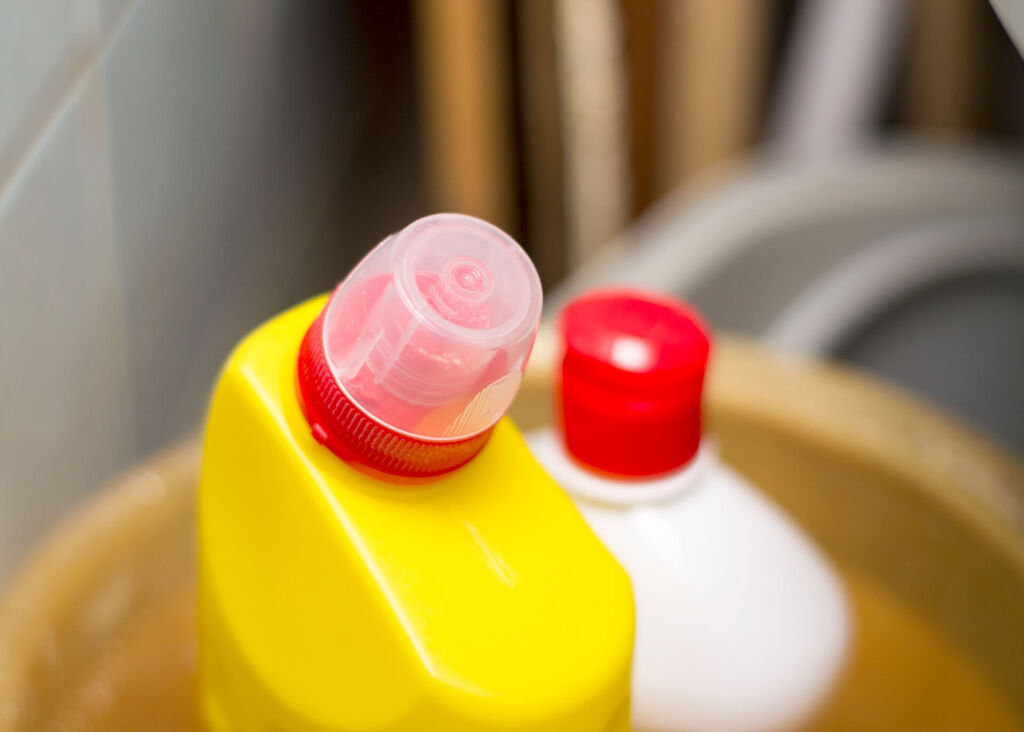
4. Coffee machine cleaning solution
Coffee machine cleaners are designed to dissolve and remove the oils, crusted coffee residue, and mineral deposits inside coffee makers. Since they work for the delicate components of coffee machines, they can also effectively clear far more robust plumbing.
Cleaners for coffee machines come as liquids and powders, so read the instructions on the package before you use them. But whatever kind of cleaner you use, the good news is that you won’t have to worry about damaging your drain pipes. Simply pour the cleaner into the sink and wait for it to do its magic.
The downside of using coffee machine cleaner is that it often doesn’t come in package sizes for household pipes. It can be expensive to use the amount that will remove coffee grounds from kitchen drains.
5. Alkaline powder
If your sink is severely clogged with coffee grounds, it may be time to break out the big guns. Powdered, caustic cleaners can dissolve even the most stubborn ground coffee clogs.
There are many products on the market, like Five Star PBW. However, alkaline cleaning powder should probably be your last resort.
They are often intended for use with restaurant equipment and other more severe drain lines. Some types of household piping can be easily broken if it makes contact with such strong substances.
Additionally, certain cleaners can be very hazardous. It’s highly recommended that you wear proper safety gear and read the instructions carefully before using them.
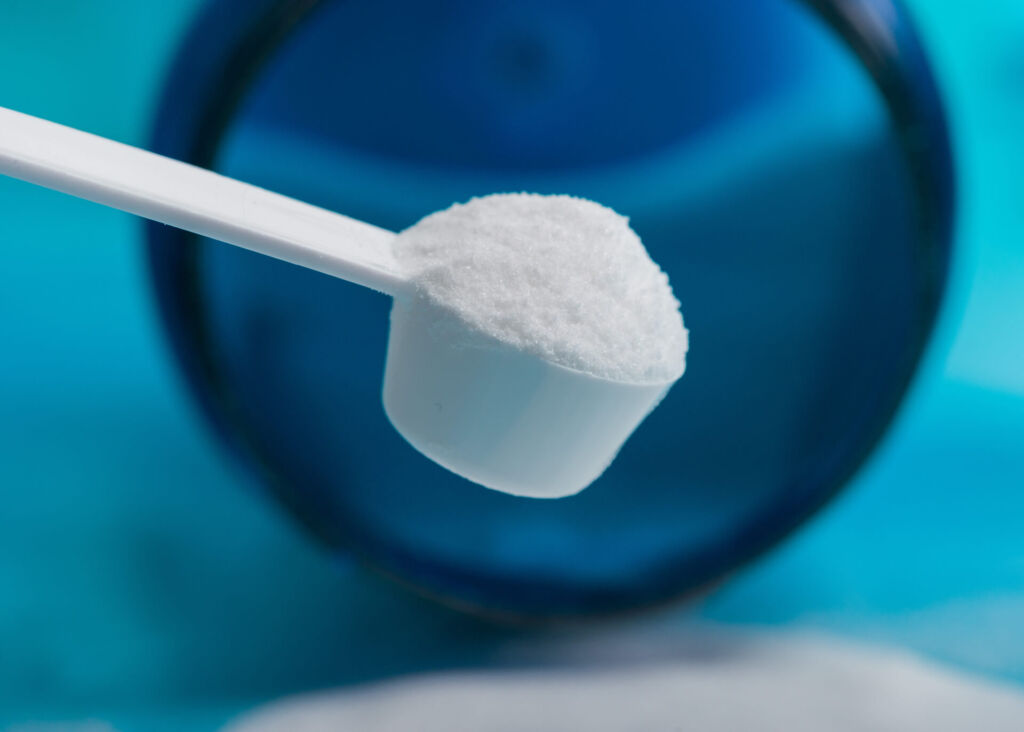
Are there alternatives to dissolving coffee grounds?
Have the discarded coffee grinds in your sink clogged so badly that cleaning substances won’t dissolve the blockage? Or perhaps you’re asking yourself, “Will Liquid Plumber also dissolve my pipes?”
You can attempt to clear a sink blocked with coffee grounds with some elbow grease and plumbing tools. Here are a few alternative methods to avoid dissolving coffee grounds.
Don’t use these methods if you’ve already poured chemicals into the kitchen drain. They could splash onto your skin and cause damage.
Utilize a plunger
A normal plunger can dislodge a mild coffee waste blockage. All you need to do is plunge the drain hole like a shower drain or toilet drain.
If you have a double sink in your kitchen, remember to plug the other drain before plunging. Otherwise, filthy water could splash out of it due to the pressure changes.
Use a drain snake
A drain snake can be the best way to clear difficult sink clogs like those formed by coffee grounds. This tool is a thin, bristled wire that you’ll slide down the drain and twist around to break apart the blockage.
Using a snake can resolve the problem quickly, but it can be challenging to get into some pipes. If you’re having trouble getting the snake to slide forward, don’t force it — you could break a pipe joint.
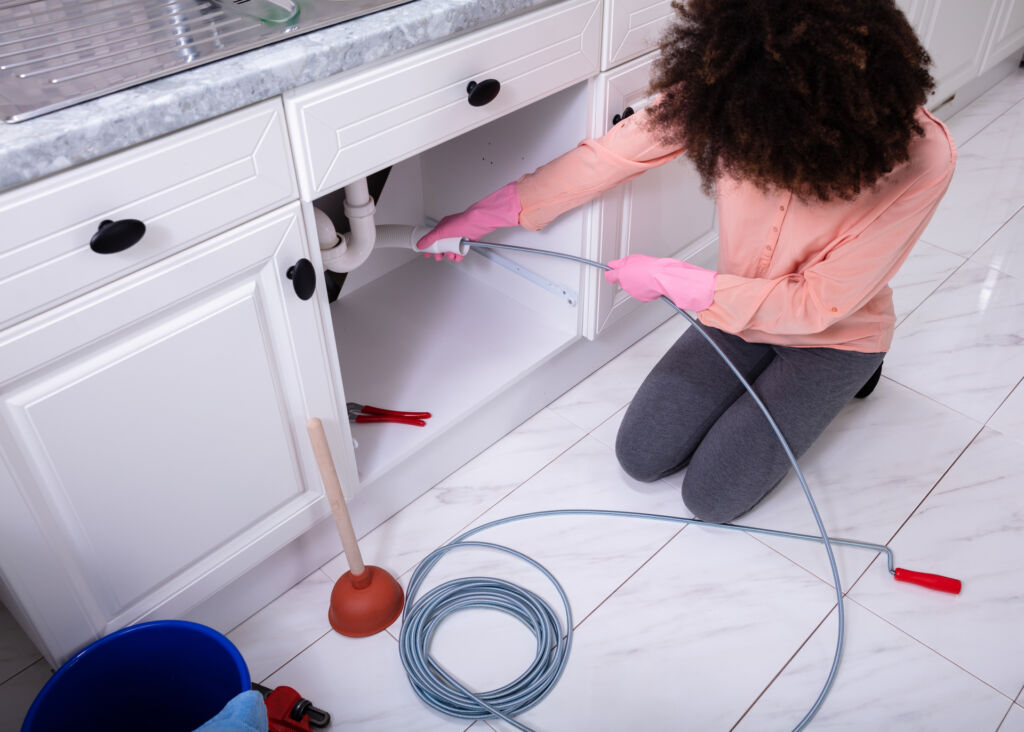
Disassemble the drain
Know that U-shaped bend in the pipes under your sink? That’s the drain trap, and it’s a common place for coffee clogs to form due to their shape.
Drain traps are usually fairly easy to disassemble. After detaching the trap, remove the coffee grounds and reassemble the plumbing.
Be sure to have a bucket handy to catch any water leaking from the pipes. You may also want to wear a face mask because there will be foul odors from the piping.
Call a plumber
You can always call professional plumbers if all else fails or you don’t feel confident about messing with your plumbing. They will clear coffee grounds and anything else you’ve washed down the sink — although you’ll likely have to pay them a pretty penny.
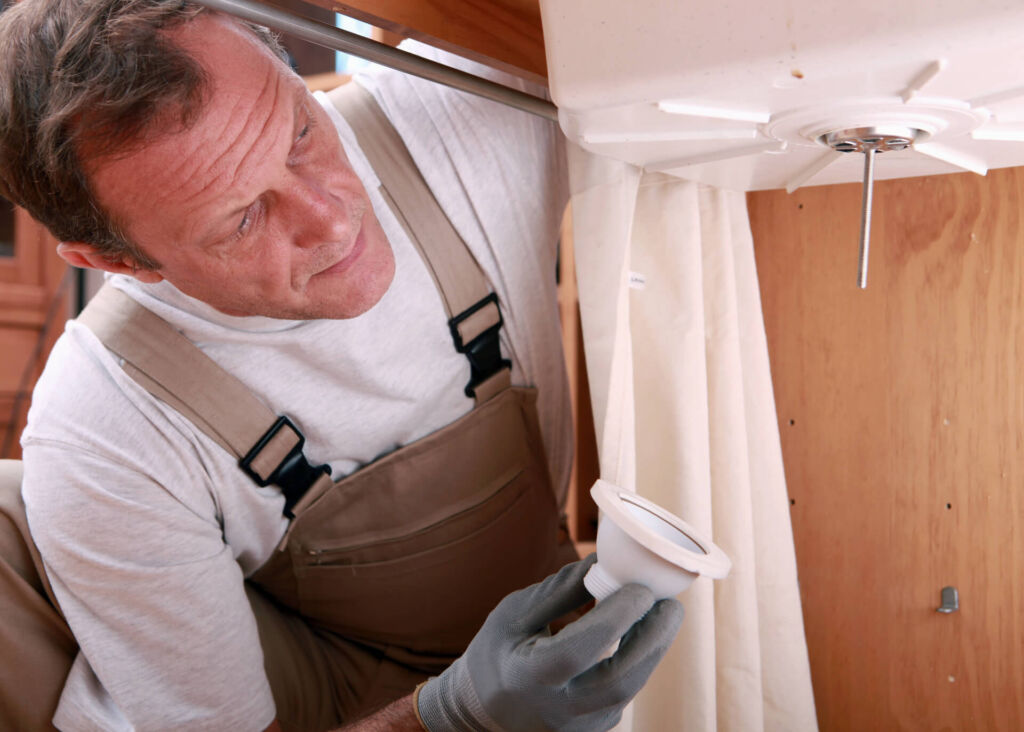
5 tips for reusing used coffee grounds
Dumping coffee grounds into the trash can is better than washing them down the drain. But an even better option is to reuse coffee grounds instead of letting them go to waste.
Soft grounds are surprisingly useful materials. Here are a few things you can do with the remnants of your morning cup.
1. Compost them
Composting releases nitrogen from the grounds and can help replenish depleted soil. Regardless if you use ground coffee with or without paper filters, it is all compostable as it is organic matter.
Empty used coffee from your Moka Pot or a French press, or throw a Chemex filter with coffee grinds directly into a compost bin.
2. Use as fertilizer
If you have a garden, add a small amount of used ground coffee directly onto the soil as a fertilizer. Coffee can also absorb heavy metals from the ground and improve its health. The acids left in them aren’t water-soluble, so you don’t need to have concerns about ruining your plants.
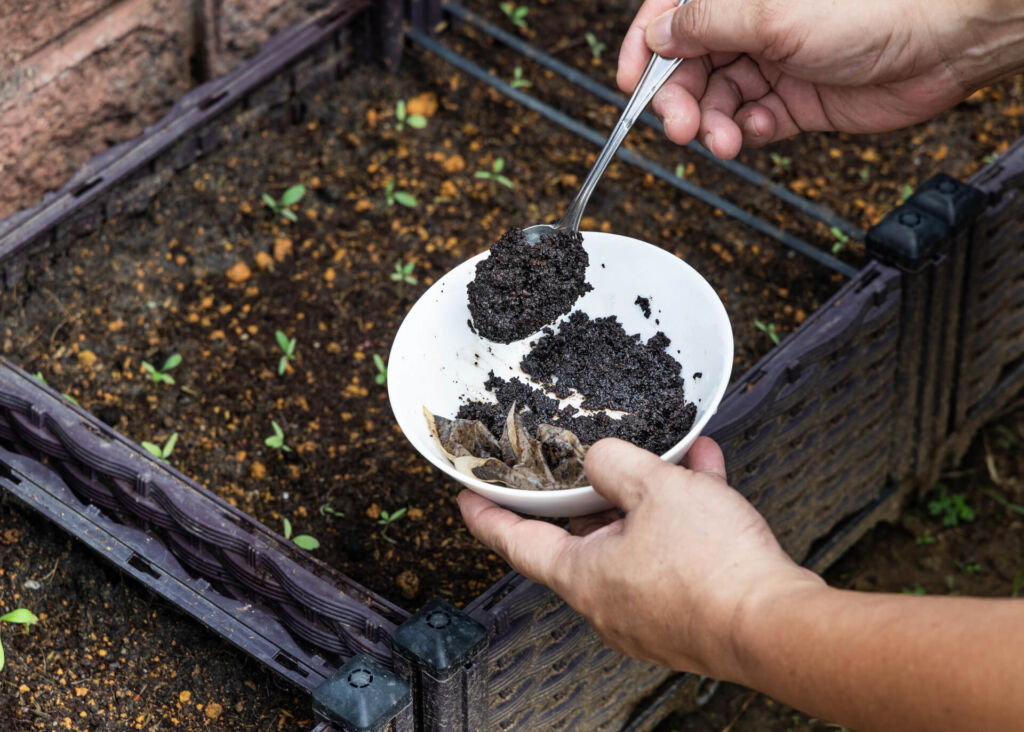
3. Repel pests
You may love caffeine, but many pests don’t. Sprinkling coffee grounds around plants can help keep insects and cats away from your garden. Like salt, they’re also effective at repelling snails.
4. Make skincare products
Coffee grounds are great exfoliants. You can use them to make body or facial scrubs and masks or even homemade soap. Turn the grounds into skincare products, and your coffee will refresh your mind and body.
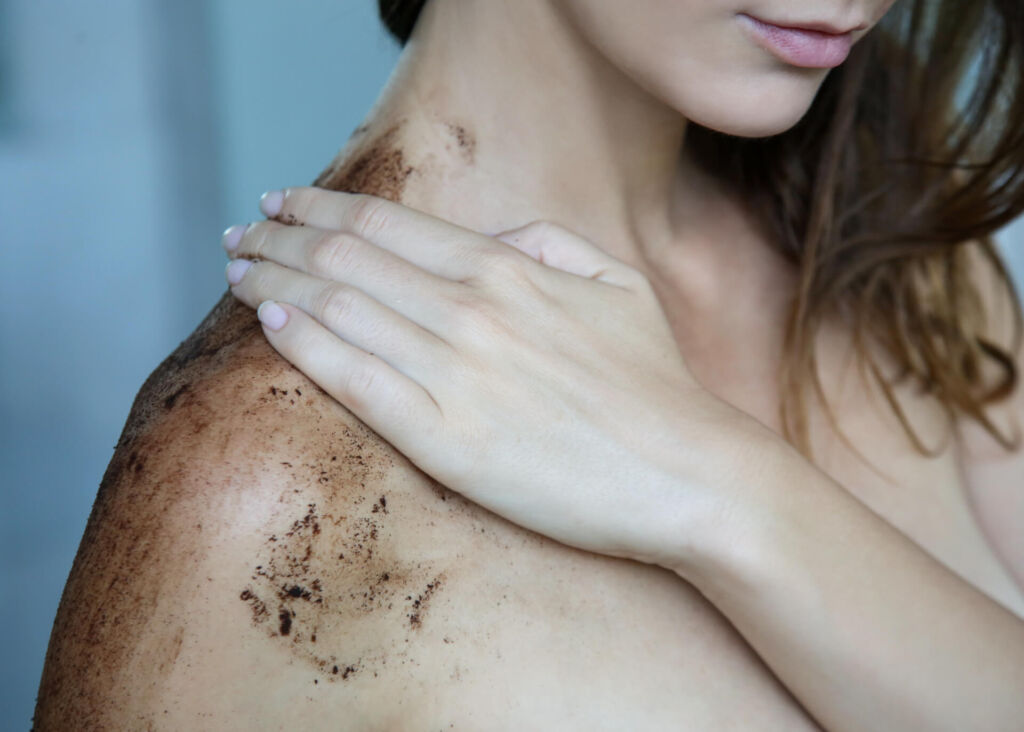
5. Dye fabrics
Most people know coffee tends to leave stains on stuff — so you know it’s a great dye! You can use coffee grounds to dye white or other lightly colored fabrics or give your hair a more intense tone. Of course, coffee can only produce shades of brown, but it can be a fun experiment if you like earthy tones.
There are many options for you to dissolve coffee grounds flushed down a kitchen sink. You can de-clog a pipe quickly and easily using the right stuff.
However, you can save yourself a lot of trouble by not dumping your used grounds into the sink in the first place. Instead, empty your brewing device or reusable coffee filter into household trash or recycle the coffee grounds.
Dispose of the grounds responsibly, and you can enjoy your coffee without worrying about your plumbing.
